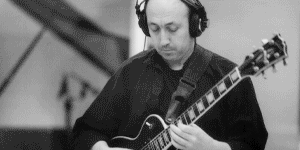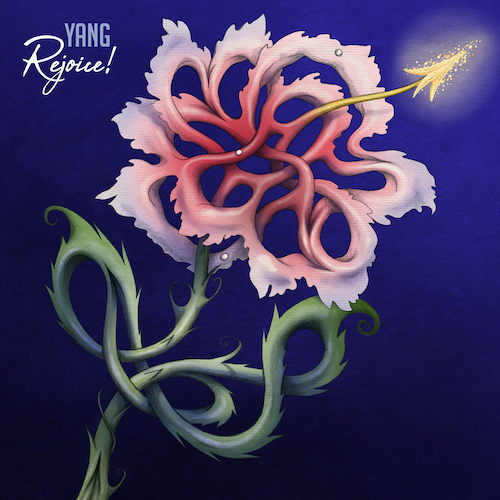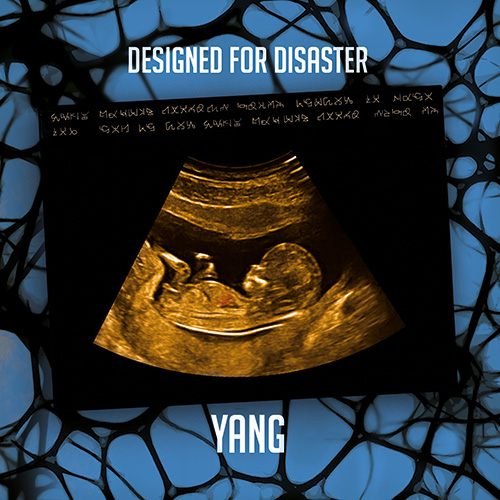As
a child, YANG composer and guitarist Frédéric L'Épée suffered from an
exaggerated fear of loud sounds—a condition that was not alleviated by
growing up in a musical family. “Every noise, even music, was
frightening to me,” he recalls. “I liked music that I could hear on the
speakers, for example, or something that was a little bit far away. But
if my grandfather was playing accordion, I had a kind of baby phrase I
would say: ‘Please don’t play accordion to my ears,’ because it was
unbearable for me. And when my father played violin as well, it was too
loud when it was in the room.”
Discovering the
electric guitar changed all that, although this revelation could easily
have gone very wrong. L'Épée recalls an early experiment in
electrification that literally ended with a bang, when he mistakenly
plugged his first instrument into an AC power outlet instead of the
family stereo. But the young musician persevered, forming his first
serious band, Shylock, in his teens and waxing two now highly
collectible albums with that formation; moving on to the
instrumental-oriented combo Philharmonie, which produced a further five
full-length LPs; and then working with YANG since 2004.
The European quartet’s fourth release, Designed for Disaster—its second for Cuneiform—just might be its loudest yet.
But it’s always purposeful noise,
as demonstrated by the new album’s fifth track, “Words”. Over an
ominously martial beat, L'Épée and his bandmates shout single-word
slogans: “Stark”, “Frei”, “Fight”, “Klang”, “Bruit”, et cetera. These
are almost but not quite drowned out by a barrage of distorted electric
guitars; the effect is that an unknown and threatening authority figure
is issuing enigmatic orders, with s consequence for those who don’t
obey. It’s eerie, and unsettling.
“I’m very happy
to hear that, because that’s certainly my intention,” L'Épée comments.
“I don’t want people to really follow the words and try to explain what
is being said; it’s mostly to feel things.”
L'Épée’s use of words—a new development for YANG, which has
previously concentrated on instrumentals—is “meant to communicate an
impression and not a meaning”, he points out. “Descendance”, Designed for Disaster’s
opening track, is similarly uncanny; backed by a
surging bassline, guest vocalist Ayse Cansu Tanrikulu intones
“If the moment feels unsafe/maybe easy again to disconnect”.
“How to explain that?” L'Épée muses. “For me, like a lot of other
people, I feel that that something is wrong in the world. And with this
latest adventure that we’ve gone through with COVID, I felt that as
people we’re lost, completely lost. And we are going wrong as we
evolve, because people are too egocentric, too much concerned with
themselves, and they don’t open enough to others. They only want to
protect their own belongings and wealth and habits and comfort. They’re
not ready to really go somewhere with humanity as a species.”
Added to these sociopolitical concerns is a relatively new interest in
ancient Chinese culture, expressed here in the concision of L'Épée’s
wordplay. “In ancient Chinese poetry, there are very few phrases, very
few adjectives,” he explains. “Sometimes, but not that much. It’s
mainly done with images. With a succession of images, Chinese poetry is
supposed to put people in a certain atmosphere—a certain ambience,
let’s say—that makes them able to feel the spirit of what the poet
wanted to express. And in that piece [“Descendance”], it’s the same.”
L'Épée adds that he’s in the process of learning Mandarin so that he
can more easily learn how to play ancient Chinese music. With Designed for Disaster,
however, his compositions primarily have their genesis in Baroque
music, minimalism, and of course the progressive rock he gravitated
towards as a teenager, with King Crimson’s Robert Fripp as his
acknowledged guru. The new record’s last track, “Despite Origins”, is
almost a textbook example of these interests, opening with an intricate
fugue for electric guitars, moving into a surprisingly accurate (and
quite lovely) pastiche of ’70s blues-rock guitar heroism, and ending
with a bleak recitative that invokes both the digital future and the
mock-liturgical feel of Carl Orff’s Carmina Burana.
“My favourite composer of all composers
is Johann Sebastian Bach,” L'Épée says. “To me, Bach is the maximum
music can go to. And Bach, in some way, is also minimalist, because he
uses very, very tiny musical materials, and builds from them
cathedrals. Of course my father was a violinist and he was mainly
interested in Romantic music, so I’ve heard that a lot. And when I came
into my own as a musician I started listening to other things: very
experimental stuff like spectral music, which I use when I play solo
and also sometimes when I compose, and minimalist music as well.”
Indeed, there are passages on Designed for Disaster that
sound very much like what Steve Reich, say, might have arrived at had
he been writing for two guitars, electric bass, and drums rather than
for percussion ensemble. But there are other factors that L'Épée, as
YANG’s sole composer, constantly takes into consideration. One of these
has to do with the group of accomplices he’s assembled: bassist Nico
Gomez, he notes, has a gift for melody; guitarist Laurent James has a
complementary ear for texture; and drummer Volodia Brice is capable of
negotiating the most complex time signatures.
“I
write for people,” he says. “I’m also a classical composer, so I knew
how to write for orchestras. But I have to take account of the
possibilities of the instruments and also the personalities of the
people. And with YANG, I know very well these guys; we are very good
friends, and we never fight together. I really imagine every note
played by them, each time I compose.
“What is happening is that every musicians plays with his own
personality, and I compose with those personalities,” he adds. “For
another lineup, I would not compose the same at all.”
And then there’s you, the listener.
“I’ve always been persuaded that without the audience, music is dead,”
L'Épée concludes. “So when the audience listens to something, it
influences the composer and the musicians, and when a song is listened
to, the song is living. It’s the same with everything in music and also
in poetry: communication with the people makes it really alive. And
it’s a collective work, of course.”
So prepare yourself for discovering YANG’s new record. If you’re new to
the group this will likely lead you on to YANG’s earlier work, the
Shylock and Philharmonie albums, and L'Épée’s prodigious solo output,
but we promise you this: it’s a fascinating and worthwhile journey.
Designed For Disaster press release
 Yang,
a French quartet whose stunning compositons combine intricate guitar
parts with driving rock, is the newest project led by French guitarist
and composer Frederic L’Epée. L’Epée’s former projects include founding
two of the most intriguing all-instrumental bands to emerge from France
and capture international interest: Shylock and Philharmonie. Yang,
L’Epee’s post-Philharmonie band, extends some of Philarmonie’s
compositional ideas while adopting a harder tempered, more rock-based
approach. Featuring the 'standard' line-up of two guitarists, bass and
drums, Yang play a dynamic instrumental music that rocks hard, and
which bears comparisons to groups such as Gordian Knot and King
Crimson. L’Epée formed Yang in September 2002.
Yang,
a French quartet whose stunning compositons combine intricate guitar
parts with driving rock, is the newest project led by French guitarist
and composer Frederic L’Epée. L’Epée’s former projects include founding
two of the most intriguing all-instrumental bands to emerge from France
and capture international interest: Shylock and Philharmonie. Yang,
L’Epee’s post-Philharmonie band, extends some of Philarmonie’s
compositional ideas while adopting a harder tempered, more rock-based
approach. Featuring the 'standard' line-up of two guitarists, bass and
drums, Yang play a dynamic instrumental music that rocks hard, and
which bears comparisons to groups such as Gordian Knot and King
Crimson. L’Epée formed Yang in September 2002. 


